-
06 August 1414 – Death of Ladislaus of Naples

1458 – Death of Pope Callixtus III

1504 – Birth of Matthew Parker, English archbishop
1514 - Marriage of Margaret Tudor and Archibald Douglas, 6th Earl of Angus
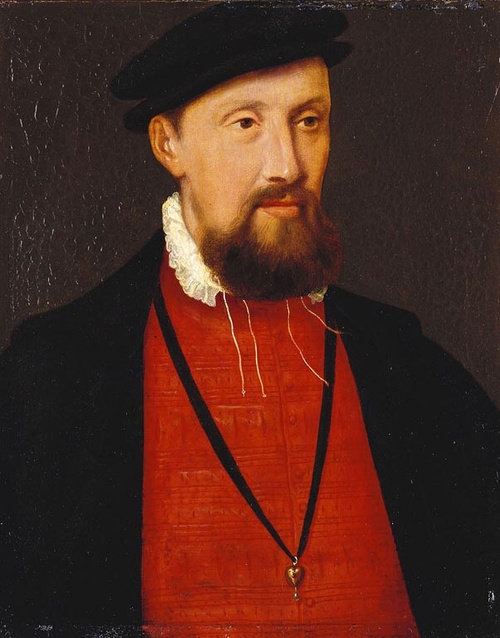

1544-Queen Catherine Parr to the Council with the King.
Has seen their letters of the 4th inst showing the King's health and success. By advice of the Council here Sir Robert Tirwhit is sent to London to despatch the ordnance mentioned in the said letters and also 2,000 spades, shovels and mattocks if they may be had. As it appears that only 13 hoys can be had for the lead, and they will only go to Lynne, Boston and Newcastle, and not thither without wafting, the Council will order crayers and ships for the purpose; but think some order should be taken, for their wafting, there where my lord Admiral is, and that it is better that it remain here than be sent forth without better wafters than can here be provided. Encloses certain letters which were sent to the Council upon a vain rumor of the landing of Frenchmen. Fearing that some seditious person had spread the rumor (for a landing of Frenchmen about Gloucester was unlikely), despatched to the justices of peace of the countries adjoining to stay the countries and enquire the truth; and received reply that all was well and the rumor supposed to arise by the departing of the navy from Bristoll for the conveyance of Lynoux, "which they judged to have departed thence as yesterday." Notifies this because such vain rumors fly fast, and this may have reached the King. The Prince and the rest of the King's children are well. Hampton Court, 6 Aug.
The Council of the North to the Council with the Queen.
As lately commanded by my lord Lieutenant in these parts, we send to the Queen (by John Broxhame, gent.), Sr de Bauldrell, Alexander the Italion and two other of the Scottish and French prisoners lately taken at Scardburgh, Yorks., by whom "we think most may be learned of their purpose into France. The Sr de Bauldrell, as we be informed by a surgeon, "is diseased in the head with the French poxe and also with another unhonest disease." The King's palace at York, 6 Aug.
1609 – Birth of Richard Bennett, English politician, Colonial Governor of Virginia
1623 – Death of Anne Hathaway, wife of William Shakespeare

source:wikipedia,http://www.british-history.ac.uk/
-
05 August 1100 – Henry I is crowned King of England in Westminster Abbey.

1278 – The Siege of Algeciras ends in the context of the Spanish Reconquista pitting the forces of the Kingdom of Castile against the Emirate of Granada. The battle resulted in a Granadan victory.
1305 – William Wallace, who led the Scottish resistance against England, is captured by the English near Glasgow and transported to London where he is put on trial and executed.

1388 – The Battle of Otterburn took place on 5 August 1388,or 19 August according to English sources,as part of the continuing border skirmishes between the Scottish and English.
The best remaining record of the battle is from Jean Froissart's Chronicles in which he claims to have interviewed veterans from both sides of the battle. His account is still regarded with some concern as details, such as the distance between Newcastle upon Tyne and Otterburn, are incorrect.
The Scottish noble James, 2nd Earl of Douglas decided to lead a raid—one of a continuing series on both sides of the border—into English territory. It was timed to take advantage of divisions on the English side between Lord Neville and Henry Percy, 1st Earl of Northumberland who had just taken over defence of the border.

1461 – Birth of Alexander Jagiellon, Polish king
1534-Reformation of the Church.
“How the false heresies which the bishop of Rome hath taught the people should be brought out of their conscience and hearts.”
1. The archbishop of Canterbury should summon a council of bishops and doctors, and have them sign their decision on each of the articles contained in the “book of the charge.” Which done, copies should be sent to each county with command to every sheriff, custos rotulorum and justice of the peace, to have them read at every sessions and great leet. All parish churches should be visited, and the curates examined how they instruct the people. Let six or seven masters of the Chancery “of the right sort, nothing favoring the Pope's laws, nor having living thereby,” be appointed to judge questions of heresy. And let sermons in English be drawn up and appointed to be preached by the curates every Sunday.
Pamphlets against the doctrines of celibacy of the clergy, honoring of images and prayers for the dead to be printed before Parliament begins.
“Bills to be drawn against the next Parliament:”
1. Allowing priests to marry and to work for their living. 2. Prohibiting, on a penalty of 10l., all offerings to images. 3. For the reformation of the pleading in the common law. 4. For reformation of the Court of Chancery “as well for injunctions procedendo and examiners of witness.” 5. For the excessive fees taken by clerks for writing in every court in England.

1540 – Birth of Joseph Justus Scaliger, French philologist and historian
1549-Clyst St Mary was the site of one of the decisive battles in the 1549 Prayer Book Rebellion, when West Country resistance to the Protestant Reformation was quashed. After the Battle of Woodbury Common on 4 August 1549, the rebels under the control of Humphrey Arundell had re-grouped with the main contingent of 6,000 at Clyst St Mary, but on 5 August were attacked by a central force led by Sir William Francis, under the control of John Russell, 1st Earl of Bedford. After a ferocious battle Russell's troops gained the advantage leaving a thousand Cornish and Devonians dead and many more taken prisoner, 900 of whom were massacred later that day at Clyst Heath. The village was burned and many of the combatants and villagers drowned in the river
1583 – Sir Humphrey Gilbert establishes the first English colony in North America, at what is now St. John's, Newfoundland and Labrador.
1600 – The Gowrie Conspiracy against King James VI of Scotland (later to become King James I of England) takes place.
1601 - Burial of Henry Norris, 1st Baron Norris of Rycote, courtier, diplomat and son of Sir Henry Norris, one of the men executed for alleged adultery with Queen Anne Boleyn.
Henry died on 27 June 1601, having outlived his wife and five of his children, and was temporarily buried, on 21 May, in the church at Englefield, where his son Edward was living.Finally, on 5 August, he was re-interred at Rycote, in a vault beneath the chapel of St Michael and All Angels, in the grounds of Rycote House. His will was dated 24 September 1589.
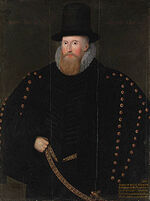
source:wikipedia,http://www.british-history.ac.uk/
-
4 August 1327 – First War of Scottish Independence: James Douglas leads a raid into Weardale and almost kills Edward III of England.
1430 –Death of Philip I, Duke of Brabant
1521 – Birth of Pope Urban VII
1530-Determination of the university of Alcala (Complutensis), at an assembly of the faculty of theology in the church of St. Ildefonso, that the marriage with a deceased brother's wife is not contrary to the Divine law, and the Pope can therefore grant a dispensation to allow such marriages. 1530, 4 Aug.
Papal mandate, inhibiting all persons, on pain of excommunication, from writing or intermeddling with the said cause, contrary to their conscience, through hope of reward or favor of any kind. Rome, 4 Aug. 1530.

1532 – The Duchy of Brittany is united to the Kingdom of France.
1549-The Battle of Woodbury Common, which occurred on 4 August 1549, was part of the Prayer Book Rebellion. Reinforcements had arrived on 2 August to assist the king's troops under John Russell, 1st Earl of Bedford, and a thousand Landsknechts (German mercenaries) arrived the following day under the command of Lord William Grey.
The king's army of some 5,000 men began a march from Honiton to relieve Exeter, which was under siege at the time, but instead of taking the heavily barricaded highway, Russell went westward, across the downs. Russell's scouts found their way barred by 2,000 men at Alphington and sent in Captain Travers to clear the road. In the words of Edward VI’s chronicler, John Hayward, those Cornishmen who were disarmed in this assault were “slain like beasts”. Russell’s advance continued onto Woodbury Common, where he pitched camp at a windmill. Here, Paulo Batista Spinola, the Italian commander, kept his men awake all night, fearing a night attack. This actually occurred at dawn the next day, on 4 August, when Devonian and Cornish forces defending Clyst St Mary came out to confront the larger force at the windmill. The difference in numbers and force of arms did nothing to deter them and the second battle of the uprising began. There were heavy losses on both sides and the result was inconclusive but Russell's army took many prisoners, 900 of whom would be executed the next day in the Clyst Heath massacre. This number was confirmed by John Hayward, Edward VI’s own chronicler
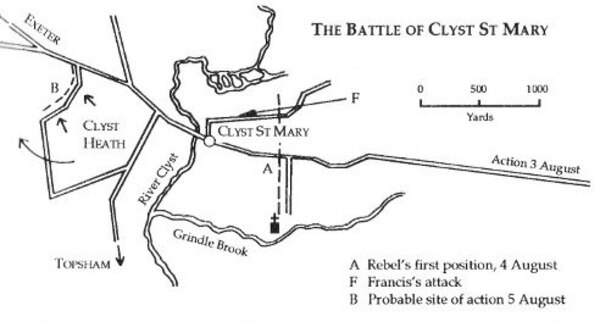
1578 – Death of Sebastian of Portugal

1598 – Death of William Cecil, 1st Baron Burghley,English statesman, the chief advisor of Queen Elizabeth I for most of her reign, twice Secretary of State (1550–1553 and 1558–1572) and Lord High Treasurer from 1572. He was the founder of the Cecil dynasty which has produced many politicians including two Prime Ministers.
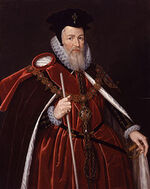
source:http://www.british-history.ac.uk/,wikipedia
-
03 August 1460 – Death of James II of Scotland
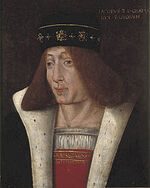
1491 – Birth of Maria of Jülich-Berg
1492 – Christopher Columbus sets sail from Palos de la Frontera, Spain.
1525-Mary queen of France to Wolsey
Asks credence for her servant, George Hampton, the bearer, concerning the detention of her "doole" in France, which her officers cannot collect. Asks him to give Hampton such letters as he desires from the King and himself to persons in France. Wishes the ambassadors in France to have the delivery of them. Wyngfeld Castell, 3 Aug

1527 – The first known letter from North America is sent by John Rut while at St. John's, Newfoundland.
1535-Chapuys to Charles V.
Does not write at length, having written several times lately. Dr. Adam, who is here ambassador for the Lubeckers, sent to me yesterday, by a man whom I had sent to a place he commonly frequents to discover anything he might be getting up here, to say that if I would promise him the favor of the king of the Romans and that of Your Majesty so that he might freely dwell in Germany or elsewhere in Your Majesty's dominions, he would bind himself to secure the kingdom of Denmark either for the duke of Holstein, or for any other whom Your Majesty pleased, without much difficulty. It was in his power to obtain the consent of the Lubeckers, and if he did not perform what he promised, he renounced the liberty which he demanded. He said also that those whom this King was sending to Lubeck and Denmark carried certain articles of peace to reconcile the Lubeckers and the duke of Holstein, which only showed English vanity; also that the courier who came from Lubeck four days ago requested the King, among other matters, not to put forward articles of peace, for the Lubeckers would not hear of it. The said Doctor is now waiting some assurance from me upon the subject, on receiving which he will disclose matters further. I intend to send and tell him that on his doing or declaring something worth while, I will do my best to obtain what he desires, and as to the said matter I could make no promise. I hear that the King is very ill pleased at the rumour of the interview of the Queens, and has since sent in great haste two couriers into France. Cromwell, going to Court lately, left here his steward (mâitre d'hotel) and principal servants, a treasurer of the King, and other gentlemen, to conduct me to the chase, whither he invited me to go; and proclamation has been made by several Councils that no one should go to hunt in the forest until I had been there. By this means they have published almost everywhere the favor that this King wishes to show me, all to spite the French ambassador (a la barbe de lambassadeur de France), and to give the people the impression that Your Majesty is on good terms with this King, and satisfied with what he is doing. I have not yet wished to go to the chase, nor do I know that leave would be given me to visit the Princess, seeing that the chase is round about her, and that I am not allowed to send my men to her. The Princess and the Queen, her mother, are of the same opinion. Cromwell told me at his departure that he would immediately let me know the King's will touching these two points, but the Princess being tired of waiting I have sent to desire an answer; of which, as soon as it comes, I will inform Your Majesty. London, 3 Aug. 1535.
1536-Chapuys to Charles V.
The day before yesterday the King returned to Greenwich from his journey to Dover, during which time he has declined the company either of the French ambassador or myself, although I offered to go with him and the French ambassador was very urgent to be allowed before the King left. After his departure the said ambassador having received letters from his master, sent to solicit an audience, which has been deferred till this morning; and after he left the Court, Cromwell sent to request me on his master's behalf that I would be at 8 tomorrow morning at the Chancellor's lodging, where a part of the Council would assemble. On his own behalf also he very earnestly requested that for the good of affairs and for his honor, considering the long communications we had had, I would show that he had not fought in vain, making overtures and proposals more advantageous to the King his master than I had made hitherto. I shall not fail to go, or to inform your Majesty immediately of all that passes between us. I take, however, the opportunity of this courier to inform you that I fear whatever show the King makes otherwise he will come to no treaty with your Majesty, unless he finds you gain some success, although he is quite of opinion that you will succeed, and it is not long since, as I am told by the Princess and others, that he said in his chamber he was displeased with the king of France for having begun this unjust war and provoked your Majesty to this dance, and that he thought you so virtuous a prince that you would not, unless compelled, have war with any Christian prince. If this be his idea all the arguments of the French to draw him to their side are fruitless, but for all this he has never said anything in his chamber except that he desires to be neutral. He even said this to the Princess when he spoke to her, saying he was asked by your Majesty and by the king of France to declare himself, which he did not mean to do, seeing neither one nor the other would do anything for him. This the King said to her after telling her that perhaps her obstinacy in not yielding to him had been owing to her trust in your Majesty, but she must consider that you could not help her while he was alive, and he asked her particularly if you had ever written to her, or if I had.
The said princess is every day better treated, and was never at greater liberty or more honorably served than now, although her household (estat) has not yet been appointed, which I trust it will be in a few days; she has plenty of company, even of the followers of the little Bastard, who will henceforth pay her Court. Nothing is wanting in her except the name and title of Princess, for all else she will have more fully than before; nor need we make too much of the name seeing that it has not been usual in this kingdom to give such a title to a daughter while there is any hope of male issue, and the Cardinal for some particular reasons had broken that custom in her case. Nevertheless Cromwell says the title will be restored to her before many days, and there is no doubt if she comes to Court she will have both that and everything she can desire for her incomparable beauty, grace, and prudence. And I think that your Majesty's affairs will proceed all the better for it; at all events it will not be for want of goodwill that your affairs do not go on more prosperously than her own.
I sent lately to warn the said Princess that there was some talk of marrying her in this kingdom to some very unsuitable person; and she sent to assure me that she would never make any match without the express consent of your Majesty, protesting that except for some great advantage to the peace of Christendom she would not care to be married at all. London
1536-William and Edmund Walsingham examined Anne Husee on the charge of addressing Henry's daughter Mary as Princess when Anne had stayed with her at Hunsdon, and whether she thought her the lawful daughter of the king. Anne Husee, knowing her head to be in danger if she continued to support Mary, took the more prudent way and besought pardon. 'She most humbly beseecheth his Highness of mercy and forgiveness, as One that is repentant for that she hath so offended and purposeth never hereafter to fall in to semblable danger, – signed Anne Husee, countersigned Edmund Walsyngham. Per me Gulielmum Petre'.

"The examination of the lady Anne Husee, received the 3rd of August."
The substance appears to be that the lady was examined, first, as to how often she had repaired to the "lady Mary" since she lost the name of Princess; and replied, only once since was discharged of her attendance on her, and that was at Whitsuntide last; that she was not sent for then, but, coming up [to London] with lord [Husee] when [he was called] to the parliament, she took the opportunity to visit her; and on the Monday (as she believed) once called for drink for "the Princess," and on Tuesday said "the Princess (meaning the lady Mary) was gone in walking;" but she had called her so merely by inadvertence. She had never heard any other person call her princess since the law had deprived her of that title; nor had heard any one say that the King's marriage with [her mother] was good and lawful, or speak of bona fides parentum, or say that she was the King's lawful daughter. She had never received any message or letters from Mary since she had left her service ; but had received tokens from her and sent her some. She had once received from her "a band for a p. . . ." She had received no message or token from her since her own committal to the Tower. She had thought the marriage between the King and the [Princess Dowager] lawful until it was declared otherwise by law, and she now thought it unlawful. Being asked who were with her during her abode at Hunsdon, she said, "lord Morley . . . . . . . . his wife and daughter, m . . . . . . Shakerley and his wife, with two . . . . . . . . . with them, another merchant . . . . . . . . his wife, Sir Edward B[aynton] . . . ." She is very penitent for having offended, and begs the King's forgiveness.
This paper is both written and signed by lady Husee, and is countersigned by Sir Edmund Walsingham, Wriothesley, and Will. Petre.
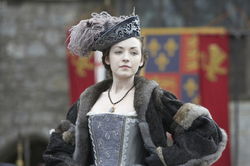
1553 - Queen Mary enters London with her half-sister, Elizabeth triumphant over Lady Jane Grey

1554 - Queen Mary and Philip of Spain set out for London

1562 - Death of John de Vere, 16th Earl of Oxford
1604 – Death of Bernardino de Mendoza, Spanish commander and diplomat
source:The Tudors wiki,http://www.british-history.ac.uk
-
2 August 1343 – Olivier de Clisson is found guilty of treason and beheaded at Les Halles in Paris. As a result, his wife, Jeanne de Clisson, sold their holding, bought a fleet of ships, and took to the sea as a pirate to seek revenge against the French King and nobility.
1521 - Wolsey arrived in Calais to act as a peacemaker between France and the Holy Roman Empire

1527-Charles V. to Henry VIII
Writes to ask his advice touching the late unfortunate circumstances at Rome. Has done so much for the Holy See that he thinks no sane person can doubt his sincerity. Has borne with injuries done him by France rather than make war for a private cause, and when in Germany refused the petitions of his subjects rather than violate the rights of the Pope. Many evils arose from this; but his conscience is clear, and his cause was vindicated by Leo X. and Hadrian VI. Clement VII., unmindful of favors, has sanctioned a league against him to drive his army out of Italy, and deprive him of Naples. Warned the Pope and Cardinals, before he took up arms, that the guilt would be theirs; but they not only despised his warnings, but violated the truce which Hugo Moncada made with them. The Pope having occupied several places in Naples, Charles's soldiers attacked Rome without his orders, and compelled the Pope to make an eight months' truce with the Viceroy. Although the conditions showed how much the Pope's advisers were opposed to him, Charles ratified it rather than take that vengeance which was in his power. But the soldiers, fearing this truce would be broken like the former, notwithstanding the remon- strances of their leaders, attacked Rome, and committed the outrage of which Henry has heard. Does not believe, however, it is so great as his maligners say. Is persuaded it was God's judgment rather than man's will, to punish the many injuries done to the Emperor; but is grieved at having gained such a lamentable victory. Hopes God will turn it to good, and thanks Him for what He does or suffers to be done. Valladolid, 2 Aug. 1527.
1581-Execution of Richard Atkins.He was an English Protestant martyr.He was charged with exclaiming against the catholic religion and the pope in public places of resort, and with an act of sacrilege in attempting to throw down the sacrament while being carried through the streets by a priest. It was also stated that a few days later, he had gone to St. Peter's once again, while divers gentlemen and others were hearing mass, he stepped forward to the altar ‘and threw down the chalice with the wine,’ and strove to pull the cake out of the priest's hand before its consecration. Being committed to prison a second time and examined, his reply was ‘that he came purposely to rebuke the pope's wickedness and their idolatry.’ After many exhortations by his own country men to recant, but in vain, he was brought to the stake with many tortures and burned before St. Peter's, 2 Aug. 1581.
1589-Death of Henri III of France

1595 - The Battle of Cornwall.
The Battle of Cornwall was a Spanish raid on Cornwall in 1595 during the Anglo-Spanish war of 1585-1604. It was conducted by a Spanish naval squadron from Brittany, France.
source:http://www.british-history.ac.uk/,wikipedia,the tudors wiki


